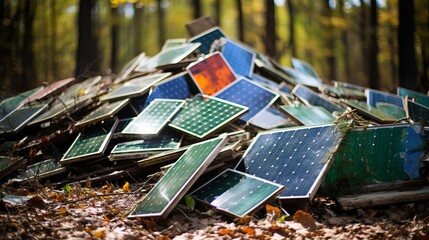
#TechTalk – Solar Panel Recycling and Disposal: Addressing Environmental Concerns
July 24, 2024 7:42 am#TechTalk - Solar Panel Recycling and Disposal: Addressing Environmental Concerns
Solar energy has emerged as a frontrunner in the renewable energy race, driven by growing sustainability and environmental awareness. However, as with any new technology, its ecological impact raises important questions. Is solar energy genuinely ‘green,’ or are there hidden environmental costs? This article explores the challenges and solutions associated with solar panel recycling and disposal.
Environmental Concerns of Solar panels – Solar panels, while beneficial for renewable energy production, have several environmental concerns associated with their production, use, and disposal. Here are some key issues:
A. Raw Materials – Solar panels depend on substances like silicon, silver, and rare earth elements. Extracting and refining these materials can lead to the destruction of natural habitats, erosion of soil, and pollution of water sources.
B. Manufacturing process – The production of solar panels requires a large amount of energy and can lead to considerable carbon emissions if the energy originates from non-renewable sources.
C. Waste Generation – According to the International Renewable Energy Agency (IRENA), it is estimated that by 2050, the world could face as much as 78 million tonnes of solar panel waste. Solar panels contain valuable materials such as silicon, silver, aluminum, and cadmium, some of which can be hazardous. Improper disposal may result in environmental contamination.
D. Harmful Chemicals – The manufacturing of solar panels utilizes dangerous chemicals such as cadmium, lead, and arsenic. Inadequate management and disposal of these substances may result in environmental pollution and pose health hazards to workers.
E. Recycling Process – The recycling process itself can be energy-intensive, requiring significant amounts of electricity, which may come from non-renewable sources, thereby contributing to greenhouse gas emissions. Some recycling processes involve high-temperature operations to melt and separate materials, which can emit pollutants if not carefully controlled.
F. Life Cycle Carbon Emissions – Solar panels produce clean energy, however the life cycle processes including raw materials, manufacturing, transportation, installation and disposable processes play a vital role in impacting the environment.
Managing the recycling and disposal of solar panels poses both challenges and opportunities. As the number of retired panels increases, it becomes crucial to create recycling methods that are efficient, affordable, and environmentally friendly. By overcoming economic, technical, and regulatory obstacles, and by encouraging international cooperation and innovation, we can guarantee that solar energy continues to be a sustainable choice for the future.”

Categorised in: Industry news, News, News, Ship & Shore, TechTalk

